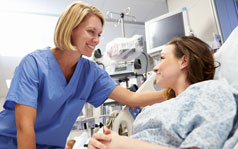18th November 2024
Cancer Care Team: Meet PeeJay Borja - Upper Gastrointestinal (GI) & Colorectal Oncology Coordinator
PeeJay Borja is an Upper Gastrointestinal (GI) and Colorectal Oncology Coordinator at Mater Private Network in Dublin. Originally from the Philippines, PeeJay qualified as a nurse in 2004 before moving to Dubai for eight years. With a wealth of international experience, he decided to move to Ireland in 2016, joining our team as a staff nurse. Through his passion for oncology, he eventually progressed into his current role in 2020.
.jpg?sfvrsn=80eb5e74_1)
Can you please describe your role as an Upper Gastrointestinal & Colorectal Oncology Coordinator?
The field of upper GI and colorectal oncology encompasses all cancers that develop in the oesophagus, stomach, liver, gall bladder, pancreas, and bowel. In my role, I oversee patients before and after they undergo surgical procedures to remove their cancer. My responsibilities can be divided into four main areas:
- Communication: I ensure that patients fully understand their treatment plan prior to surgery. This involves discussing their care during the consultation with the surgeon, providing educational materials and being available to answer any questions that may arise.
- Education: I serve as a resource of information about upper GI and colorectal cancer for healthcare staff, patients and their families, empowering each participant involved in the healthcare journey with knowledge and support.
- Co-ordination: the cancer care team facilitates weekly multidisciplinary meetings, where each patient’s case is presented and most appropriate treatment pathways discussed by a panel of surgeons, oncologists, radiologists, and pathologists. Prior to the meeting, I gather the patients’ information, including clinic letters, reports and scan results, to be presented at the meeting.
- Collaboration: I work closely with the members of the cancer care team and other healthcare professionals, including dietitians, physiotherapists and social workers, to streamline our patients’ healthcare experience.
What are some of the warning signs people should watch out for?
The symptoms of cancer can vary between upper GI and colorectal cancers and may include:
Upper GI cancer
- Difficulty swallowing
- Persistent bloating or fulness after eating
- Poor appetite
- Unintentional weight loss
- Abdominal pain
- Excessive tiredness
- Nausea and vomiting
- Black stool
Bowel cancer
- Change in bowel habit, including increased frequency, looser motion or constipation
- Blood in your stool or bleeding from the rectum
- Abdominal or rectal pain
- A lump in the abdominal area or rectum
- A feeling of incomplete bowel evacuation
- Weight loss
- Excessive tiredness
What steps can be taken for maintaining a healthy digestive system?
Through lifestyle changes, individuals can significantly improve their overall health and reduce the risk of developing various cancers, including upper GI and colorectal cancers. Key recommendations include:
- Diet: reduce the intake of sugary, salty, and fatty foods while increasing the consumption of fruits, vegetables, grains, and legumes.
- Weight management: maintain a healthy weight through diet and exercise.
- Avoid smoking and excessive alcohol consumption: both habits can increase the risk of developing cancer.
While these types of cancers are more common in patients over 60, there has been a rise in cases among younger populations, influenced by sedentary lifestyle and family history of cancer.
Can you describe how working at Mater Private Network has impacted your professional and personal growth?
Since the commencement of my role at Mater Private Network, I felt supported by my colleagues on both a professional and personal basis, which has enhanced the care provided to my patients. Culturally, I have noticed a significant emphasis on empathy within the Irish healthcare system. This experience has deepened my compassion, allowing me to better connect with patients through an understanding of their perspectives.
What do you enjoy the most about your role?
I find fulfilment in interacting and connecting with patients, and ensuring they are well taken care of at each step of their healthcare journey. Witnessing their success stories and progress towards recovery is incredibly rewarding.







-(1).jpg?sfvrsn=88c86230_1)


.jpg?sfvrsn=3e4b4b4f_1)
.jpg?sfvrsn=c9f41eb4_1)
.jpg?sfvrsn=ec7c101c_1)
